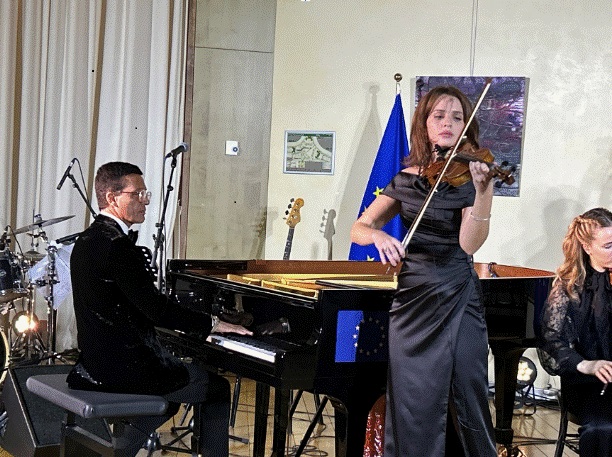Harfouch's Music Illuminates Brussels With Harmony And Hope

In a first for the European Commission, a concert of classical music was performed Tuesday evening in the min hall of the famous Berlaymont building in the heart of Brussels. On the eve of a meeting of the European Council where EU heads of state will discuss growing instability and security challenges in the world, the honorary president of Dialogue & Democracy Omar Harfouch premiered an item he had composed specially for the occasion.
The two-movement piece is entitled "Sauvez une vie, vous sauvez l'humanité", or "If you save a life, you save humanity" and is an appeal for global peace. The phrase itself is found in the Talmud and the Qur'an, from which Harfouch read to the audience, itself probably another first.
A formally trained classical concert pianist, Harfouch introduced the piece by explaining that it consists of two contrasting sections. The first is redolent of a joyous life full of love, life, light and happiness, characterized by tolerance and mutual respect. The second reflects the opposite, a life dominated by sadness, fear, destruction, loss of hope and darkness. They pose a crucial question: which world do we want to live in: the first or the second? Harfouch challenged the audience by asking them to promise that they would each do what they could to ''save a life'' after hearing the composition.
As well as Omar Harfouch playing his composition on the piano, accompanied by his regular Ukrainian violinist Anna Bondarenko, the orchestra was made up of 15 musicians of different nationalities: French, Belgian, Syrian, Ukrainian and Macedonian.
The first movement resonated with a jubilant celebration of love, evoking the warmth of shared moments and the joy of connection. Harfouch's piano danced with exuberance, and Bondarenko's violin sang with a tender lyricism that captured the essence of love's sweetest moments. From the first resonant chords, piano and violin engaged in a mesmerizing dialogue, creating a sonic tapestry, commencing with a delicate exploration of love, the piano's gentle arpeggios intertwining with the violin's expressive phrasing to express the essence of love's endeavor and, to an extent, love's expense.
The second movement had piano, violin and cello engaging in a haunting conversation, each instrument contributing to the overarching atmosphere of melancholy. Harfouch's deliberate keystrokes painted a desolate canvas, setting the stage for Bondarenko's violin the rest of the orchestra to intertwine in mournful harmonies that echoed the depths of sadness. As the composition progressed, piano passages conveyed a palpable sense of trepidation, mirroring the anxiety-ridden heartbeat of the human soul.
As the second movement concluded, the audience, visibly moved and some with tears in their eyes, erupted into a sustained standing ovation, recognizing the flawless execution and profound emotional depth of the performance. The resounding success prompted immediate requests for Harfouch and his orchestra to replicate the piece across all European cities, a testament to the impact it had on ambassadors and dignitaries present at the event.
European Commissioner Olivér Várhelyi deserves commendation for his patronage and attendance at this groundbreaking event, which served as both a cautionary tale and a beacon of hope. Harfouch's remarkable concert urges individuals, from ordinary citizens to heads of state, to choose the life-affirming path that has the potential to save humanity from itself.
(Omar Harfouch is a classically trained concert pianist, businessman, TV personality, media owner and peace advocate now residing in Paris. He campaigns for political reform in his native Lebanon, in particular against corruption and for a reformed secular republic. He has spoken in parliaments throughout Europe about the need for dialogue, tolerance and mutual respect as the precursors for peace and coexistence.)
© Copyright IBTimes 2025. All rights reserved.





















